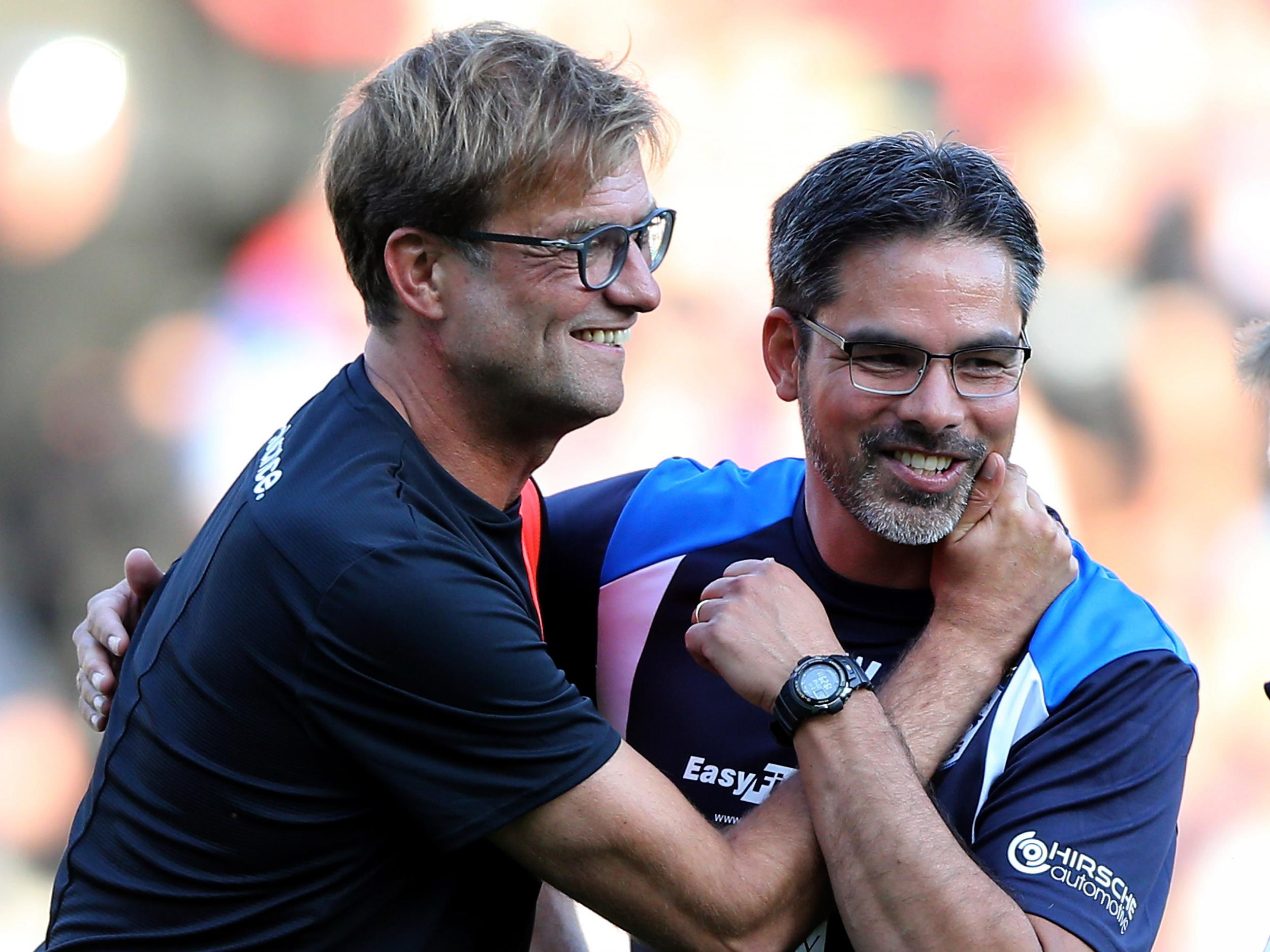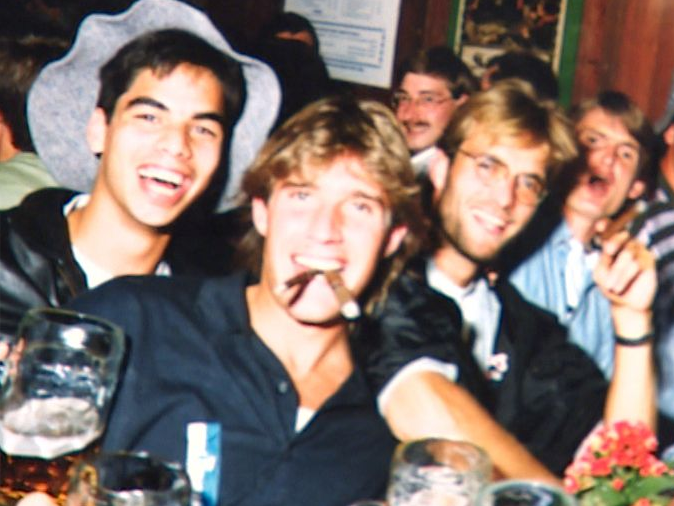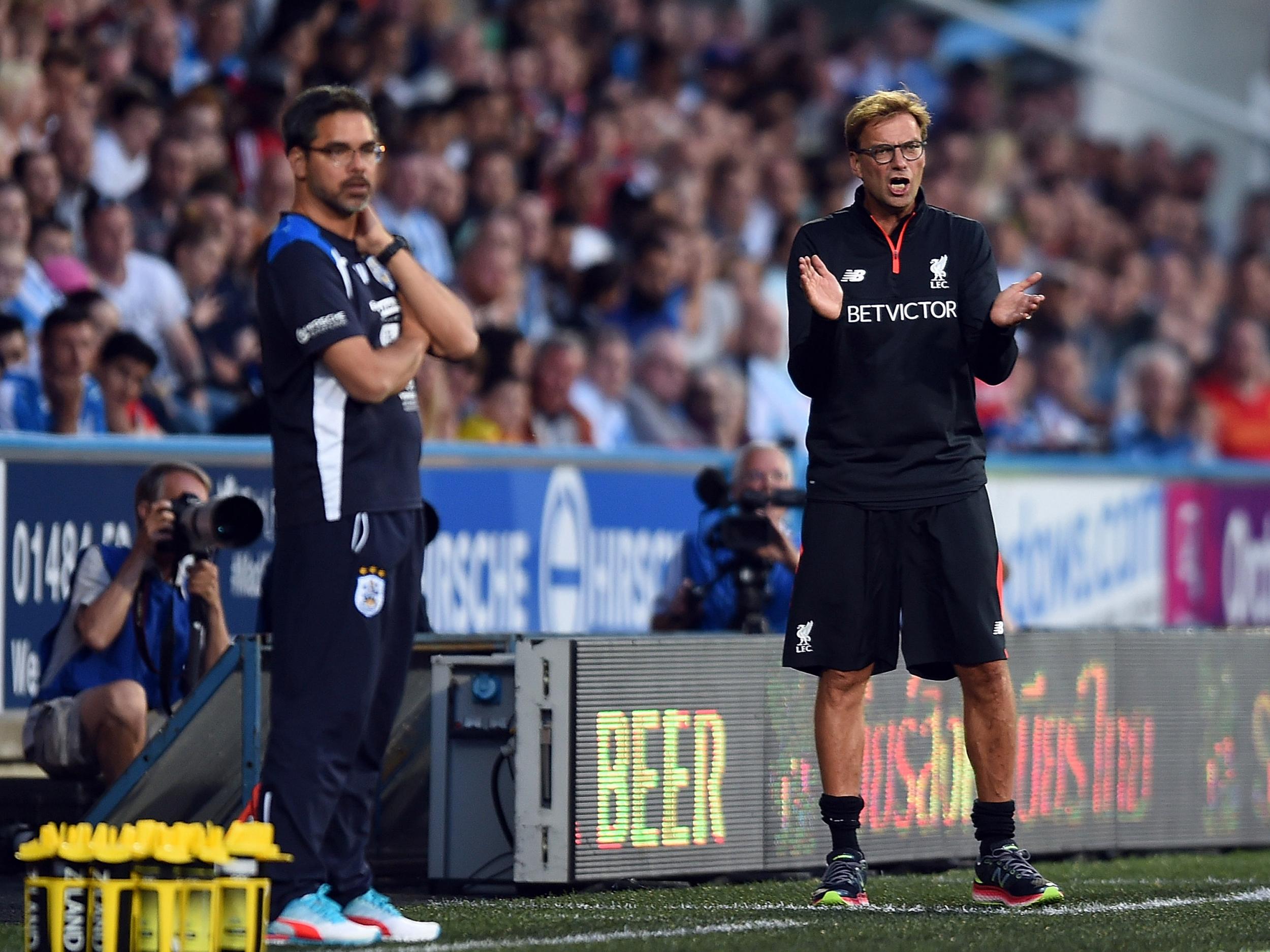Liverpool vs Huddersfield: Wide-eyed ingénue vs weary pedagogue as Jurgen Klopp and David Wagner reunite
The pair are close friends, with Wagner best man at Klopp's wedding

Your support helps us to tell the story
From reproductive rights to climate change to Big Tech, The Independent is on the ground when the story is developing. Whether it's investigating the financials of Elon Musk's pro-Trump PAC or producing our latest documentary, 'The A Word', which shines a light on the American women fighting for reproductive rights, we know how important it is to parse out the facts from the messaging.
At such a critical moment in US history, we need reporters on the ground. Your donation allows us to keep sending journalists to speak to both sides of the story.
The Independent is trusted by Americans across the entire political spectrum. And unlike many other quality news outlets, we choose not to lock Americans out of our reporting and analysis with paywalls. We believe quality journalism should be available to everyone, paid for by those who can afford it.
Your support makes all the difference.The photograph below was taken in Munich, around 1991. You can tell it was a long time ago, at any rate, because who still takes physical photographs? There are other giveaway period details: the smouldering cigar in Jurgen Klopp’s left hand, the hearty stein of beer in David Wagner’s right.
Mainz have just earned a creditable 1-1 draw at 1860 Munich, and as Klopp remembers, they all went to Oktoberfest afterwards, so by all accounts it was a fairly messy one all round.
Most of all, though, it’s the faces. Klopp, 24 years of age, already has his trademark beard and glasses. There’s a seriousness in his eyes, the look of someone older than his years, a leader ahead of his time. Wagner is only 19, unrecognisable from the Huddersfield Town manager with the greying chin and the baseball cap. It’s his first full season as a professional footballer, and the goofy grin on his chops is that of a kid who can barely believe his luck.

This is perhaps the earliest known photograph of Klopp and Wagner together. On Saturday, they will embrace in the Anfield dugout, and hundreds, perhaps even thousands, more will be taken. There is a natural interest in the first Premier League meeting between these two managers who, for more than a quarter of a century, have been both colleagues and companions.
“We hate it when our friends become successful,” Morrissey famously wrote. But for Klopp and Wagner, that sensation will last for only 90 minutes. They genuinely revel in each other’s triumphs: when Huddersfield clinched promotion at Wembley last May, Klopp remembers crumpling to the floor and crying like a baby. When Huddersfield beat Manchester United last weekend, one of the first congratulatory messages lighting up his phone was from Klopp. “More like a family member than a friend,” is how Wagner describes him.
It is a bond that goes beyond football. Klopp is the godfather to Wagner’s daughter. Wagner was Klopp’s best man, and for the stag do, took his friend to Mainz’s famous Christmas market. In order to protect Klopp’s identity - for he was a club legend and Mainz, after all, is a small town - everybody was kitted out in Santa costumes and masks. Within minutes, a bystander pointed at one of the Santas and exclaimed: “That’s Klopp.”
This recollection, and many more, can be found in the exquisitely-titled ‘Hearts and Mainz’, the Sky Sports documentary that aired on Thursday night. One of the reasons the programme is so compelling is that it subtly recasts the established narrative of their relationship: of Wagner as a manager trying to escape Klopp’s shadow, trying to forge his own path in the wake of his trophy-laden superstar pal. Along the way, it suggests that the common perception of Wagner as a “mini-Klopp” or a “Klopp clone”, as one newspaper put it, is one that masks more than it reveals.
Naturally, the similarities are there. “Very similar, from the way they talk to the way they dress,” Neven Subotic, who worked with both at Borussia Dortmund, tells the programme. “Brothers that were separated at birth. They would throw each other, push each other, kick each other in the butt.”
Their management styles, too, are of a piece. Both speak intelligently and passionately, in the tasty morsels and catchy sound-bites so beloved of players and media. They both favour a harsh training regime; a highly athletic, highly aggressive style of football based on energetic pressing, quick transitions and forward rather than sideways movement.
They seek to inspire not just loyalty but love, creating a family environment bonded if not by blood, then by the market-leading blood substitute. Wagner orders all his players to live with 15 miles of Huddersfield and takes them on crazy survivalist expeditions to the Swedish wilderness. Klopp bonds his squad over jovial team dinners and hugs you until his glasses literally break.
Those are the similarities. And yet, perhaps the best way of understanding their journey is to look at their differences.
Perhaps the pivotal moment in their shared story comes in 2011, a point at which their paths could scarcely have been further apart. Klopp, having shelved his modest playing career to take his chances in management, was perhaps the hottest young coach in world football, having led Borussia Dortmund to a brilliant Bundesliga title. Wagner, meanwhile, was on the verge of drifting out of the game altogether.
Having spent five years studying for a degree in biology and sports science, he was at a crossroads. A few bits of coaching work had come his way, and he was still keen to stay in football. Klopp knew how talented his friend was, but he also knew how ruthless the world of coaching could be. “No,” he told his friend. “I don’t help you. Because I don’t want you to be in this business.”
Wagner took his friend’s advice, and started training to become a teacher. Germany treats its public servants well, and once you get a job you are pretty much guaranteed a salary for life. But “if you’ve got this football virus in you,” as Wagner put it in an interview with the latest issue of FourFourTwo, “it will come back.” That was the point at which he got a call from Michael Zorc, the sporting director at Borussia Dortmund, who were looking for a new second-team coach.

In what is the most interesting part of the documentary, Klopp recalls the moment. “Michael called me and asked me: ‘Do you think David’s right for the job?’” Klopp’s head drops theatrically in despair. “Yes,” he says sadly, unable to lie, aware that the die has been fatally cast. “I think he’s right for the job. To be honest.”
You know the rest. Klopp conquered all before him at Dortmund before spectacularly collapsing in his final season and leaving with tears in his eyes. Wagner hung around, impressively building his CV with the second team, waiting for a chance to make his mark as a No1. By coincidence, Klopp got his job at Liverpool around the same time that Wagner got his at Huddersfield. And so here we are.
Why do we think Klopp felt such resistance to the idea of Wagner following his path? Perhaps a clue lies in their respective personalities. Wagner is quieter than Klopp, less intense, more jovial, an attitude he ascribes to his brief time with the US national team. “I learned about the easy, American way of life,” he told ESPN recently. “To take things much easier than in Germany. I learned that you don't have to be ‘in the tunnel’ 24 hours before a game. You can relax until you come into the dressing room, then focus one or two hours before the game.”
Perhaps these differences are simply a function of character, perhaps life story: Wagner, with his university degree, his taste of the real world of work, his vaguely exotic upbringing as the son of a US military man, certainly seems to have a broader perspective on things other than football.

Or perhaps Klopp and Wagner are simply on different parts of the career curve: separated in age by just four years, but by a lifetime in terms of experience. Klopp has been a first-team manager for 16 years, Wagner just two. His coaching career has been one short success story: promotion with the Borussia Dortmund second team, promotion with Huddersfield: awards, critical acclaim, hipster love, underdog appeal. He has never won a Bundesliga title, never stepped out in a Champions League final, never produced one of the most exciting teams in recent footballing history.
But nor has he ever seen an empire that he built crumbling at his feet. He has never been relegated with the team he loves, or seen Bayern Munich picking off his cherished squad like trained snipers, or felt the weight of expectation that comes with taking over one of the world’s most famous clubs at a period when its yearning for glory is deeper and more unrequited than at any point in its history.
This game scars you. Every defeat leaves a scratch. When you pour your heart and soul into this job, it could scarcely be otherwise. Wagner has not been in management long enough to be badly scarred. Responsibility, pressure, burden of reputation, sadness: in all these areas, Klopp is streets ahead. Which may explain why he occasionally seems a little more worldly-wise: a believer still, but one with the knowledge that belief will only get you so far.
It has been interesting to contrast their varying demeanours this season: Wagner, the wide-eyed ingénue, the media darling whose team can go down 4-0 to Tottenham and have it written off as a bad day at the office. Klopp, the weary pedagogue, the tarnished hero whose team can go down 4-1 to the same opposition, and suddenly it feels like an existential crisis.
And you wonder, when Klopp embraces Wagner on Saturday afternoon, whether there will be just the faintest twang of nostalgia there. Perhaps even a vague envy for his old friend, still at the bottom of the mountain, still grinning like the kid in the photo, still unhurt. Perhaps pessimism is simply optimism plus time.
Join our commenting forum
Join thought-provoking conversations, follow other Independent readers and see their replies
Comments